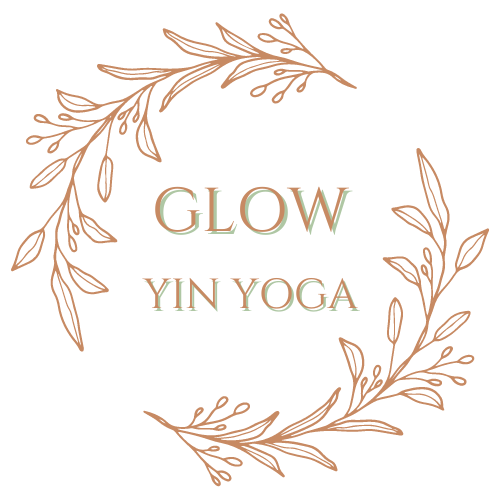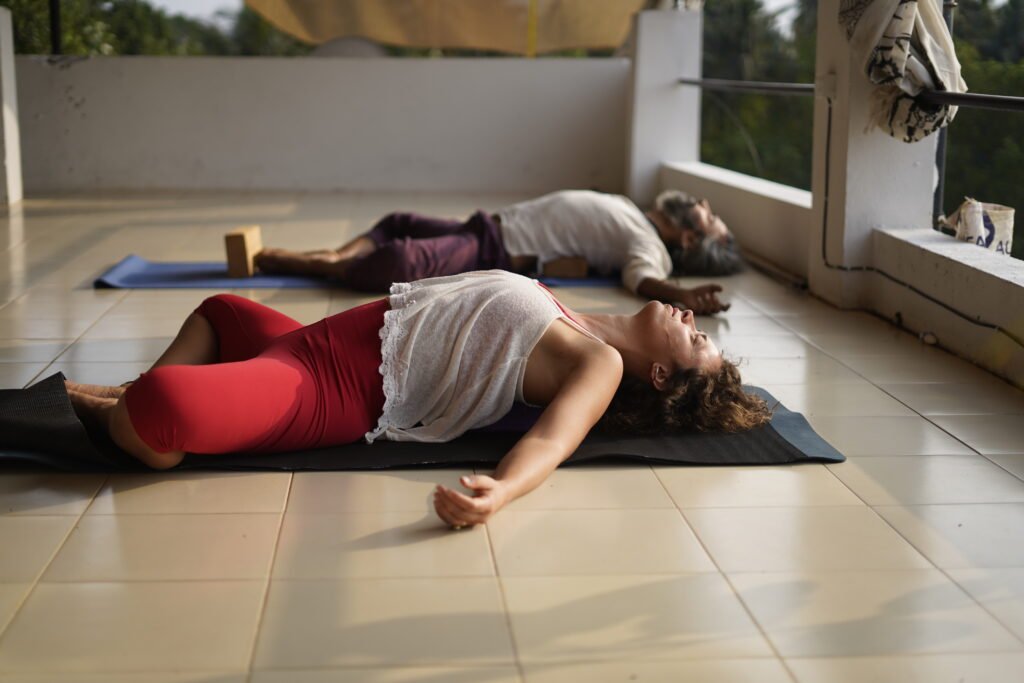
Yin Yoga is a gentle and meditative practice that emphasizes long-held, passive poses, targeting the deep connective tissues, ligaments, and joints of the body. This unique form of yoga offers a refreshing balance to the more dynamic and muscular styles, providing practitioners with a calming and introspective experience. Whether you are a seasoned yogi or new to the practice, a Yin Yoga training course can deepen your understanding and enhance your teaching skills. In this article, we will explore the essence of Yin Yoga, the benefits of its postures, and the journey to becoming a Yin Yoga instructor.
What is Yin Yoga?
Yin Yoga is a slow-paced style of yoga with asanas (postures) that are held for extended periods. Unlike other yoga practices that focus on building strength and flexibility in the muscles, Yin Yoga targets the connective tissues, including the fascia, ligaments, and joints. This practice is designed to increase circulation in the joints and improve flexibility, promoting a greater sense of inner calm and relaxation.
The philosophy of Yin Yoga is rooted in the Taoist concepts of yin and yang, where yin represents stillness and yang represents movement. By balancing the body’s yin and yang energies, practitioners can achieve physical, emotional, and spiritual harmony. Yin Yoga is often practiced in conjunction with yang styles of yoga, such as Vinyasa or Ashtanga, to create a well-rounded and balanced practice.
Understanding Yin Yoga Postures
Yin Yoga postures are typically performed seated or lying down, and each pose is held for a prolonged period, usually between three to five minutes or even longer for advanced practitioners. The primary goal of these postures is to apply moderate stress to the connective tissues, encouraging them to become stronger and more flexible over time.
Some common Yin Yoga postures include:
- Butterfly Pose (Baddha Konasana): This pose targets the hips and lower back, helping to release tension and improve flexibility in the groin and inner thighs.
- Caterpillar Pose (Paschimottanasana): A forward bend that stretches the spine, hamstrings, and shoulders, promoting a deep sense of relaxation.
- Dragon Pose (Anjaneyasana): A lunge position that opens the hips and stretches the quadriceps and hip flexors.
- Sphinx Pose: A gentle backbend that targets the lower spine, promoting spinal health and flexibility.
These postures, when practiced mindfully, can lead to profound physical and emotional release, making Yin Yoga a transformative practice for many.
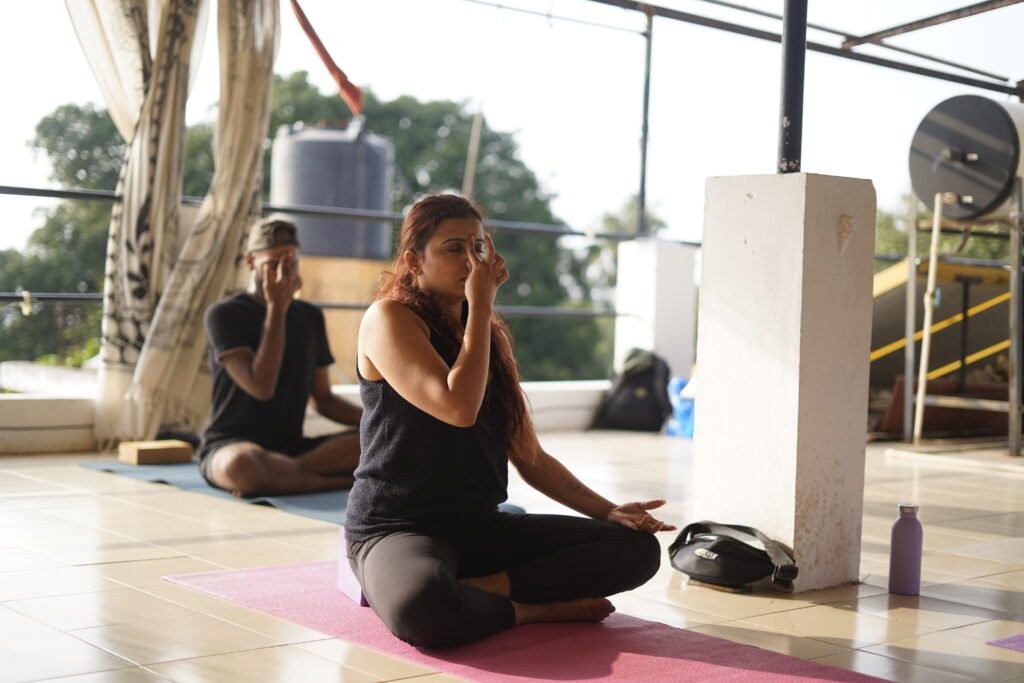
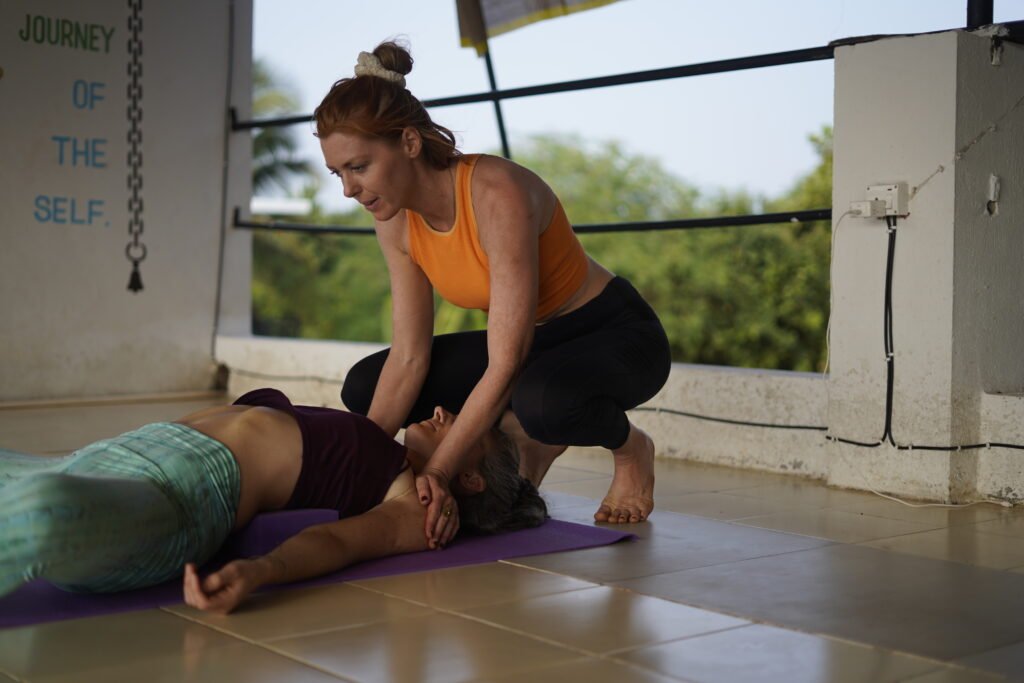
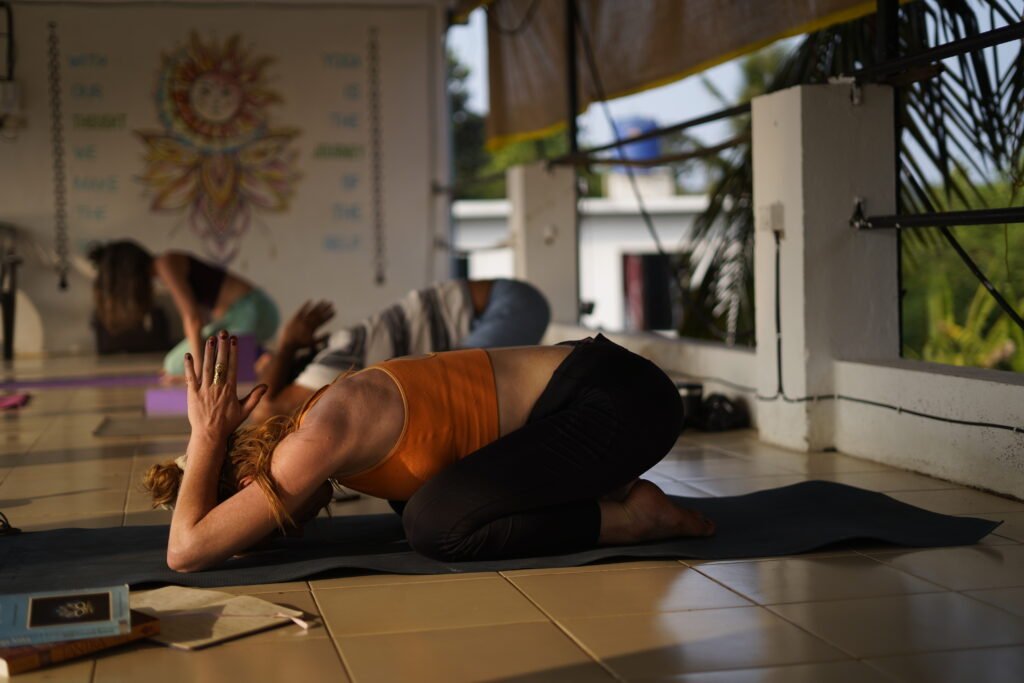
The Yin Yoga Teaching Course
A Yin Yoga teaching course is an excellent opportunity for those looking to deepen their practice or become certified instructors. These courses typically cover a range of topics, including the principles and philosophy of Yin Yoga, anatomy and physiology, sequencing, and the art of teaching.
Key Components of a Yin Yoga Teaching Course:
- Philosophy and Principles: Understanding the Taoist roots of Yin Yoga and its connection to the body’s energy channels (meridians) and the Five Elements Theory.
- Anatomy and Physiology: Learning about the body’s connective tissues, the role of fascia, and how Yin Yoga postures affect different parts of the body.
- Posture Breakdown: Detailed exploration of Yin Yoga postures, modifications, and props usage to accommodate different body types and abilities.
- Sequencing and Teaching Methodology: Developing effective class sequences, understanding the pacing and timing of poses, and learning how to create a supportive and safe environment for students.
Completing a Yin Yoga teaching course not only enhances personal practice but also equips participants with the skills and confidence to guide others in this gentle yet profound practice. It is an enriching journey that offers insights into the subtle energies of the body and the art of stillness.
Yin Yoga Retreats: Deepening Your Practice
Yin Yoga retreats offer a unique opportunity to immerse oneself in the practice, away from the distractions of everyday life. These retreats are often held in serene locations, providing an ideal environment for deep relaxation and introspection. Whether you are a beginner or an experienced practitioner, a Yin Yoga retreat can offer a transformative experience.
Benefits of Attending a Yin Yoga Retreat:
- Focused Practice: Retreats allow for extended practice sessions, enabling participants to explore postures in greater depth and cultivate mindfulness.
- Holistic Experience: Many retreats incorporate complementary practices such as meditation, pranayama (breathwork), and Ayurveda, offering a holistic approach to well-being.
- Community and Connection: Retreats provide an opportunity to connect with like-minded individuals and form lasting friendships, fostering a sense of community and support.
Popular destinations for Yin Yoga retreats include Bali, Thailand, and India, each offering unique cultural experiences and stunning natural landscapes. Whether you seek relaxation, healing, or a deeper understanding of Yin Yoga, a retreat can be a rewarding and enriching experience.
Yin Yoga Trainings: From Beginner to Advanced
Yin Yoga training programs are available at various levels, catering to both beginners and advanced practitioners. For those new to Yin Yoga, introductory courses provide a solid foundation in the principles and practices of this style. Advanced Yin Yoga training courses delve deeper into the philosophical and energetic aspects, offering a more comprehensive understanding of the practice.
Advanced Yin Yoga Training:
Advanced Yin Yoga training is designed for practitioners and teachers who wish to deepen their knowledge and refine their teaching skills. These courses often cover advanced postures, sequencing techniques, and the use of props to support deeper releases. Additionally, advanced training may explore the energetic aspects of Yin Yoga, including the meridian theory and the subtle body.
Completing advanced Yin Yoga training can enhance one’s ability to teach and share the practice with others, offering a more nuanced and informed approach to guiding students through the postures and the introspective journey of Yin Yoga.
Choosing the Right Yin Yoga Instructor
Selecting the right Yin Yoga instructor is crucial to your learning experience. A skilled instructor can create a safe and supportive environment, guiding you through the practice with clarity and compassion.
Qualities to Look for in a Yin Yoga Instructor:
- Experience and Certification: Look for instructors who have completed recognized Yin Yoga teaching courses and have experience teaching a variety of students.
- Approachability and Communication: A good instructor should be approachable, patient, and able to communicate the principles and postures clearly.
- Mindfulness and Presence: An instructor who practices mindfulness and presence can create a calming and focused atmosphere, enhancing the overall experience.
Finding a qualified Yin Yoga instructor can significantly enhance your practice, providing you with the guidance and support needed to explore the depths of this transformative practice.
Embracing the Journey of Yin Yoga
Yin Yoga is more than just a physical practice; it is a journey into the self, offering profound insights and healing. Whether you are looking to deepen your practice, become a certified instructor, or simply find peace and relaxation, Yin Yoga has something to offer everyone. By exploring Yin Yoga postures, attending a teaching course, or participating in a retreat, you can unlock the many benefits of this gentle yet powerful practice. Embrace the journey of Yin Yoga and discover the transformative potential of stillness and introspection.
To book the Yin Yoga training of your dreams now, go to our Avalible dates and choose the training for you!
Contact us for any questions through our contact form or directly via email info@glowyinyoga.com
